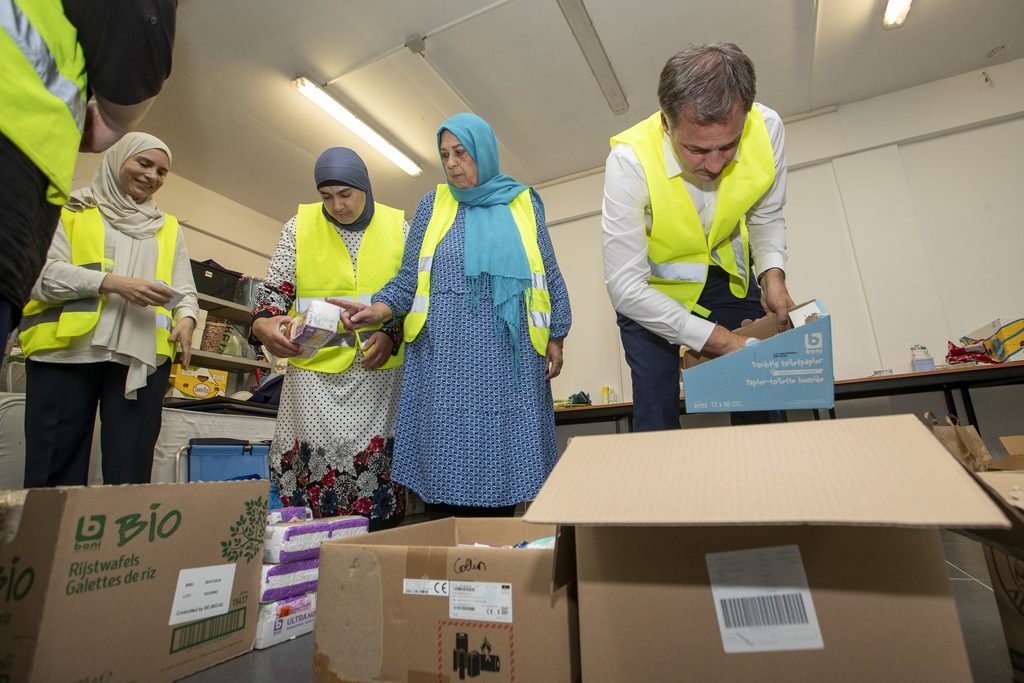While the natural disasters in Morocco and Libya happened in the same week, the state of international aid to both countries – including from Belgium – has been completely different.
Belgium's B-Fast rapid intervention team is present neither in Morocco nor in Libya, but the reasons for that are very different. For Morocco, the B-Fast team is even ready to go to the area, but the country is currently only accepting help from a handful of countries, including Spain, the UK and the United Arab Emirates (UAE), according to the ambassador.
"The roads are not prepared to handle all the promised aid coming in from countries at the same time, especially in the Atlas Mountains and rural areas," said Yasmien Naciri, founder of a development aid organisation that has been active in Morocco for ten years.
Still, there are also politics at play, she stressed. There are tensions in Morocco with France over Western Sahara (which both Morocco and Algeria claim, with France favouring Algeria). So Morocco is not accepting French aid for the time being but is accepting it from the UAE.
With Libya, on the other hand, the administrative context in the country is very weak and fragmented, professor of political science and Director of the Central Africa Programme of Egmont, Koen Vlassenroot (UGent) told De Morgen.
"To set up aid, you need a strong partner," he said, adding that Libya has two rival governments baying for power, and only the one in the west of the country enjoys international recognition. "The east of the country, where storm Daniel caused the greatest damage, is still seen as a conflict zone."
For Belgium's Foreign Affairs Ministry, that is exactly what makes it impossible to send people from its B-Fast aid team to the country. On Wednesday, EU Commissioner for Crisis Assistance Janez Lenarčič announced that Libya was activating the Civil Protection Mechanism (EUCPM) to get European aid. In response, Belgium is providing 240 tents, 700 sleeping bags and 4,400 essential kits to help the people affected by these terrible floods.
Federal Minister for Development Cooperation Caroline Gennez announced that the country will allocate as much as €1 million for emergency humanitarian aid in Libya. Earlier, the Federal Government announced it was keeping €5 million aside for Morocco.
Greater media attention
Overall, aid to Libya is seemingly coming in slightly slower than that to Morocco, where the earthquake also happened first.
Large organisations such as the Red Cross have been present in both countries from the beginning, but the largest disaster areas in Morocco are in the Atlas Mountains and therefore difficult to reach, while the problem is much more centred in Libya.
"There was a wide strip of damage passing through the centre of the city of Derna, so to speak. This allows help to be organised more efficiently," the Red Cross said.
Rather than sending material or people, the Red Cross is opting here for financial support – this way, both the local economy gets a boost and local partners can better determine where help is needed first. For both countries, Belgians can deposit money into a special account. Particularly for Morocco, this is already happening – likely because of the greater media attention.
That difference in media attention for both disasters is not only the case in Belgium, but also in the rest of the world: "There are also very few foreign journalists [in Libya]," said professor Koert Debeuf (VUB) to De Morgen, referencing the ongoing crisis there since 2011.
Related News
- Belgium releases €1 million extra humanitarian aid for Libya following devastating floods
- Flood death toll in Libya tops 5,000
- Morocco earthquake: 'Too much help can be counterproductive,' says ambassador
As fewer news reports about the disaster in Libya were brought to Belgians' attention, this also led to fewer public aid initiatives for the country. In comparison, initiatives for Morocco were already being set up last weekend.
While the number of deaths in Libya is estimated to be about twice as high as in Morocco, there are some logical explanations for the difference, Debeuf pointed out. "The main one being the Moroccan diaspora. As many people migrated to the West in recent decades, a lot of European countries have much more direct, personal and even family ties with Morocco. With Libya, these are largely absent."

